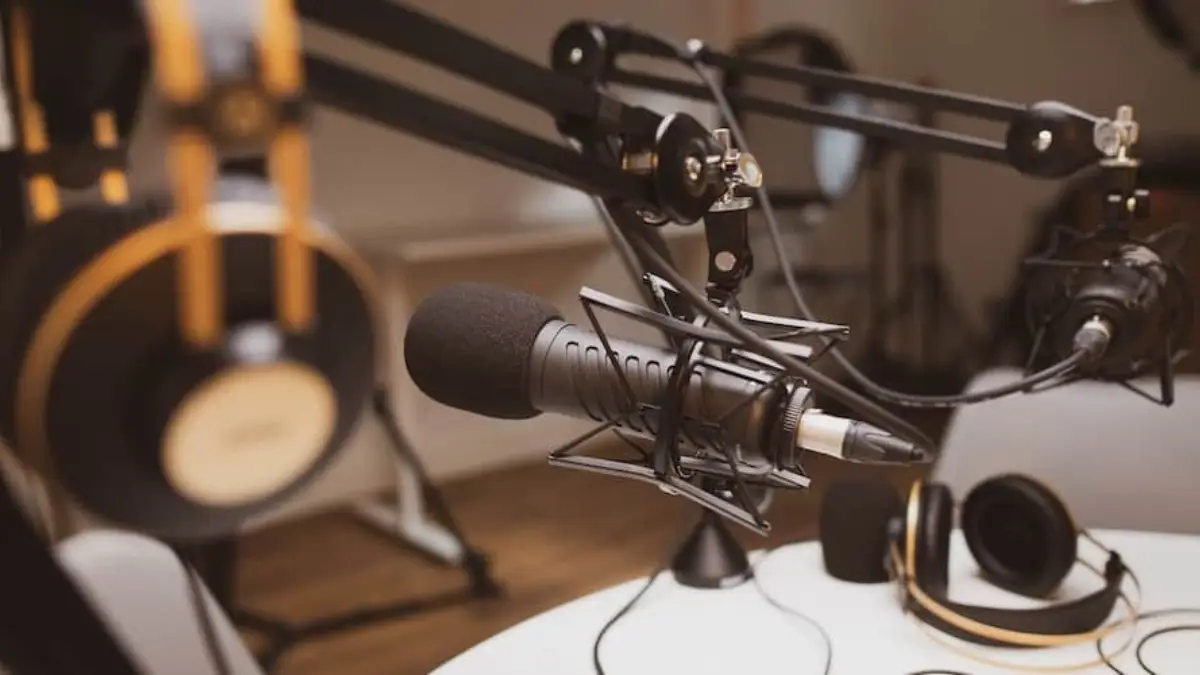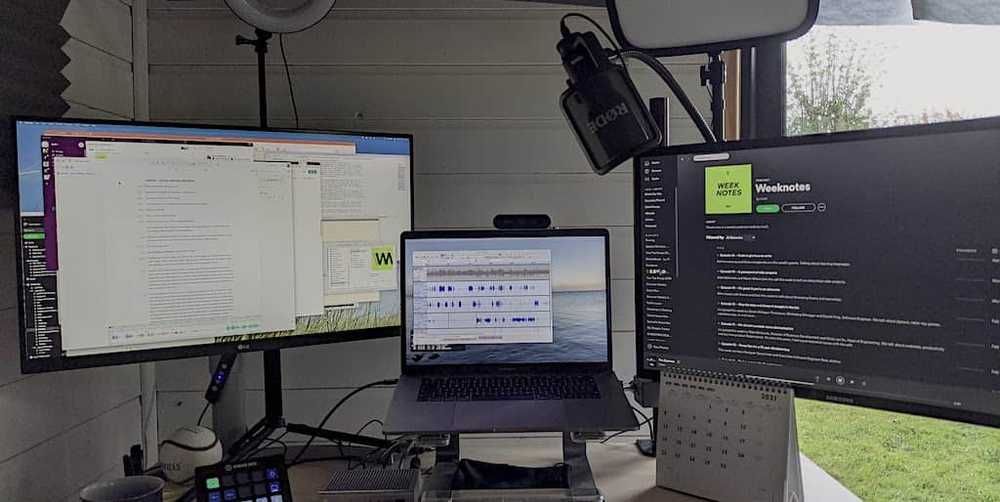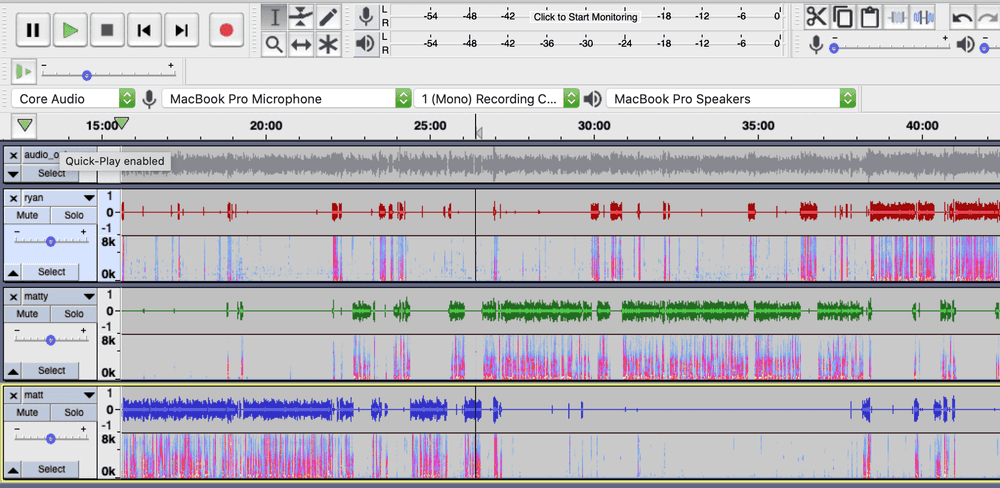
How we podcast

At Instil we tend towards obsessive. With our programming, we strive for high quality and really focus on producing clean code. That attention to detail spills over into our culture too. Our coffee club sweats the details of the bean, the roast and the grind; our foodies run their own wood-fired pizza ovens; our gardeners grow forests and win prizes at flower shows; our athletes run marathons over mountains. There's room for all kinds of people at Instil, but we like them to be invested.
One of my favourite websites about people who really care about their craft is https://usesthis.com/, a site that publishes articles where people describe the tools they use to do their work. I love the insight into how other people work and I frequently learn about new tools that I can adopt to improve my own practice.
I'll probably never get an opportunity to have my own process described on that site, so instead here are a few notes on how we produce our podcast.
With our podcast, Weeknotes, we're also invested in achieving excellence. But that doesn't mean heavily produced. We aren't a radio show, so we don't all have studio quality microphones and soundproofing. We're recording in a distributed way, with people working in their bedrooms, kitchens and garden sheds. Our sound quality isn't going to reach the standard of This American Life or 99PI.

I'm the one constant on the show (so far). I setup the call, confirm the topics and then edit and publish the final product.
Proper Preparation Prevents…
I plan guests a few weeks out. I use Evernote for most of my personal planning (still, even after hating on it in episode 1) so I have a Podcast notebook with recording dates alongside names and other notes.
We usually record on a Friday, with the expectation that I get the editing done for a release the following Wednesday. That hasn't happened so frequently between January and April 2021 as the workload of my day job as a software trainer has been pretty heavy.
As the recording day approaches, I create a conversation on Slack between the guests and post a link to a Google Sheet for managing show notes. The Weeknotes concept means guests bring their own topic, and it should be recent and relevant. We coordinate in the Sheet so we can all come prepared on the day, yet often the best bits of the recording aren't what we'd planned to talk about. I'm happy with that; we want the podcast to reflect the sort of conversations we'd have if we were in the office together - a mix of extremely technical concepts with the occasional discussion about which supermarket makes the best mince pies.
Tap, Tap, Is this thing on?
We record the show via Zoom, usually for an hour. Zoom is helpful because it produces separate audio files for each guest that I can edit cleanly. The audio quality is "good enough", particularly as we're typically recording in echoey rooms in our homes using Airpods or the built-in microphone on our Macs. I do ask guests to record locally too (QuickTime is perfect) so I have a clean media file in case there's a network problem. Local recordings can be problematic, because most of my guests don't have hardware mute buttons, so I can hear them typing, talking or coughing when they thought they were silenced (thankfully I've not overheard anything embarrassing yet!) If you need a system-level mute I can recommend Mic Drop
I aim for episodes to be less than 20 minutes in length, and I typically start with between 45 minutes and an hour of material. Someday I'll be able to split the recording neatly into multiple episodes, but it's only happened once so far.
On the cutting room floor
Editing is really fiddly and annoying, but important to get right. Apart from working hard to ensure my guests sound good by removing gaps, filler words and stumbles.

I edited the first series and most of the second using Audacity. Having each speaker as a separate track makes it easy to cut out crosstalk and other noises. I listen to the whole recording and add lots of labels so I know what the content is at a glance. Usually there's three or four large topics that I work through in turn, cutting out filler words and any gaps or mistakes. That process can take a long time, as I end up listening to sections four or five times to make sure the flow works.
However, I've recently switched to Descript for editing. Being able to edit the audio by editing text is amazing. What's not quite so amazing is the transcription quality. It doesn't handle Northern Irish accents very well yet.
So now, I first adjust the audio in Audacity by applying noise reduction and loudness normalisation on each track, and cutting them so they're all the same length. Then I import into Descript and pull them into a composition. After the automated transcription is finished I make lots of corrections to the transcript before editing by deleting text I don't want. The filler word removal workflow is a time saver, as is being able to cut and paste without worrying about lining up different audio tracks.
After the edit is finished and I have the final podcast content I do one more pass, removing breath noises and other artifacts before exporting as a WAV file and transcoding it to MP3 for publication through a tool called Forecast, which allows me to tweak the metadata inside the final MP3 (title, shownotes, a picture and sometimes chapters).
Our first season was transcribed by my colleague Amy, whereas now that I'm using Descript the transcript is available as part of the edit. The new way is not as good (because it's missing Amy's excellent additions).
Ship it!
We're currently self-hosting our podcast on AWS. It's a simple Jekyll site uploaded to S3. We don't need a hosting service since we won't be inserting ads and we don't want to use invasive analytics, and a twenty minute MP3 at 64kbps doesn't fill many bytes. In fact, even if we do end up being popular I don't think it'll cost as much as a basic podcast hosting service. I don't want to use privacy invasive analytics, so for analytics right now I download the CDN stats from CloudFront and adding them to Google Data Studio. Something I should really automate…
Our numbers are still low, but that's no problem since we don't really want to be famous. We're approaching the end of our second series, and we're getting into a reasonable rhythm. On every episode I hope you'll learn something interesting about the two (or three) Instillers I have with me, get an insight into what technologies we're working with and also learn our opinion about industry trends.
We'd love to hear what you think. Is there something you need to hear our opinion on? Let us know by emailing us at podcast@instil.co
Lead Photo by Jonathan Farber on Unsplash